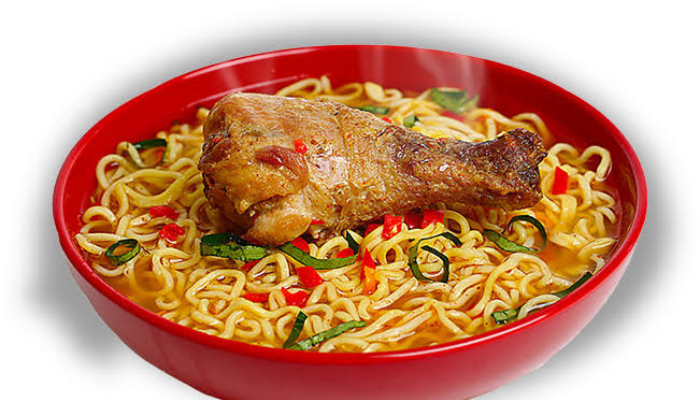…Sales hit six-year high
The sales of noodles in Nigeria increased by more than a third last year, new data show, as the soaring price of rice forced more consumers to opt for cheaper alternatives.
A report by Euromonitor International, a global market research provider, shows that the sales value of noodles in the country’s formal market rose year-on-year by 38.2 percent to N427.2 billion in 2023, the highest in at least six years.
Pasta sales rose by 26.1 percent to N404.0 billion, while that of rice rose by 14.4 percent to N494.0 billion.
The sales volume for noodles increased to 266,600 tonnes from 263,700 tonnes. Pasta sales volume dropped to 384,700 tonnes from 396,600 tonnes, while 520,400 tonnes of rice were sold as against 547,400 tonnes in 2022.
“Noodles was the only subcategory within rice, pasta and noodles to see growth in 2023, though this was marginal. While all staple foods struggled throughout the year, small pack sizes and minimal preparation time (three to five minutes) make noodles an affordable option in challenging times,” the report said.
It said noodles had become increasingly popular in food service due to convenience and low prices. “Indeed, in April, the leading noodles player Dufil Prima Foods Plc opened its eighth mono-brand foodservice outlet, Indomie Café, with plans to open more outlets in the future.”
The report added that pasta is also considered to be a cheap and convenient meal, but high unit price increases in 2023 (30 percent, following a 55 percent increase in 2022) due to the rising price of wheat as a result of the war in Ukraine dampened volume demand.
“Rice saw the most substantial retail volume decline within rice, pasta and noodles in 2023. Packaged rice faces intense competition from unpackaged rice, as food specialists tend to purchase large bags of rice, which they sell to local consumers in smaller, more affordable quantities,” it said.
A breakdown of the data shows that plain noodles recorded the same sales of N0.9 billion in 2023 and 2022. But instant noodles rose from N308.3 billion to N426.3 billion.
“I eat noodles a lot because it’s cheaper than buying rice to cook. Although the quantity I used to buy was a pack, I have reduced it to half and sometimes don’t buy eggs with it. But overall, it’s a more affordable foodstuff than rice that’s selling for over N1,000 per derica,” Oyinda Aminu, an Abuja-based system analyst, told BusinessDay.
Olatide Praise, who is a student of the University of Lagos, said she always makes sure that she has noodles.
“It is what sustains me throughout the semester because it is cheap and fast to cook. Sometimes I go for cheaper brands to afford two cartons,” she added.
Over the past seven months, the inflation rate in Africa’s biggest economy has accelerated to the highest in at least 20 years largely on the back of the federal government reforms including the removal of petrol subsidy and naira devaluation.
The headline inflation rose to 28.92 percent in December from 28.20 percent in November, according to the National Bureau of Statistics (NBS).
Food inflation, which constitutes 50 percent of the inflation rate, quickened to 33.93 percent from 32.84 percent in the previous month.
A BusinessDay survey of some major markets in Lagos shows that the price of a carton of noodles ranges between N6,000 and N6,500; a carton of spaghetti, N13,000-N13,500; and a 25kg bag of rice, N25,000-N32,000.
“In particular, relatively high inflation and fuel price hikes limited consumer spending power while unit prices across all brands accelerated. The average unit price for rice, pasta and noodles increased by 30 percent in 2023, following a 40 percent increase in 2022,” authors of the Euromonitor report said.
They added that even though products within this category are generally considered to be essential, local consumers gravitated towards unbranded/unpackaged staple foods, including unpackaged substitutes for rice and pasta.
Analysts at SBM Intelligence said in a recent report that despite cost-cutting and inflation management measures, Nigerian households spent 97 percent of everything they earned solely on food.
“The Tinubu administration has its work cut out – arresting spiralling insecurity, tackling grinding poverty, enhancing economic opportunity and forging a sense of national consciousness. It is safe to say that it is not off to a great start,” they said.
The World Bank’s latest Nigeria Development Update report revealed that rising inflation and sluggish growth in Africa’s most populous nation increased the number of poor people to 104 million in 2023 from 89.8 million at the start of the year.
This means that from January to November, an additional 14.2 million people fell into poverty.
“The impact of this inflation is especially hard on the poor and vulnerable. The Government has initiated targeted cash transfers to mitigate some of the impact on the most vulnerable households. In addition, a holistic approach to reducing inflation, including through tighter fiscal and monetary policies, is also needed,” the report said.
BusinessDay reported two weeks ago that staple foods, which make up a chunk of household meals, declined marginally for the second straight year to 2.47 million tonnes last year from 2.57 million tonnes in 2022.
An outlook report by the Food and Agricultural Organization, World Food Program, and others projected that Nigeria and other countries across the West Africa region are expected to see increased prices of staple foods such as rice, maize, millet, and cereals in 2024.
“Staple prices currently remain above the five-year average across the region. This is attributable to a combination of factors including production deficits, trade restrictions, insecurity in the Sahel, elevated global prices, high transaction costs, and currency depreciation in the coastal countries of the Gulf of Guinea,” it said.


